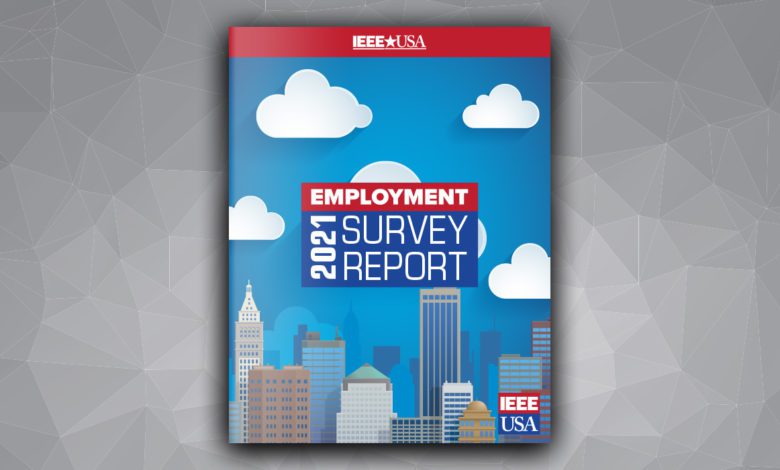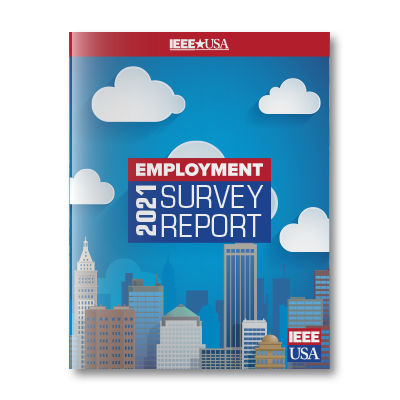

The 2021 IEEE-USA Unemployment Survey Report, IEEE-USA’s 17th survey of unemployed U.S. IEEE members, reveals that the COVID-19 pandemic, while less impactful than it was on healthcare workers, or the tourist industry — not surprisingly — did have a significant impact on the engineering field. Two significant changes from last year’s survey are that salaries upon reemployment were down significantly; also, a much greater percentage of the unemployed saw the national economic situation as a barrier for re-employment. Roughly one in four of those unemployed indicated their unemployment was the result of the COVID-19 pandemic, behind anticipated or expected business downturn (34.5 %).
Since 1995, IEEE-USA has surveyed unemployed members to understand how they were being affected by employment trends and to help IEEE-USA-USA’s Career and Professional Development Committee better assist members who are dealing with unemployment. As in the past, the survey was given to members who had requested a reduction in dues because of unemployment (2,532 members). This year, because of COVID-19, the survey was also given to a random selection of 4,000 higher grade members. The surveys were completed in January 2021, with a response rate of 8.4% (11.5 % in the first group and 6.5% in the second).
According to the report, “Salaries among those re-employed continue to be significantly lower than prior to being unemployed, but expectations among those still looking for work have not adjusted accordingly.” The survey highlighted the difficulty unemployed members have faced in obtaining a new position that maintained pre-unemployment salary levels. The median salary upon re-employment from those who had obtained new positions was $60,000 — down $23,000 from the previous year’s report of an $83,000 median. The median salary before their unemployment had been $140,000.
The report stated, “Salary expectations among those looking for work remain consistent and optimistic, in spite of the pandemic’s economic impact revealing downward pressure on salaries.” Those who had not found a new job by the time they took the survey remained optimistic — possibly unrealistically optimistic — that they could maintain pre-unemployment salaries (this optimism was in line with prior years). According to the report, despite the pandemic, “The percentage of respondents saying the long-term outlook for engineers is good or excellent remains high.”
Maintaining benefit levels was also a concern. When taking total compensation, benefits, quality of life issues, and other aspects of a position into consideration, just more than half of those surveyed (53.2%) indicated that their current positions were worse, or much worse, than the positions they held immediately prior to their periods of unemployment. Just slightly more than one in four indicated their current position was either better, or much better — up from one in five in 2019.
The greatest barrier to rehiring was listed as age (81.5 %), with the authors of the report stating, “Overwhelmingly, participants saw age as a barrier to employment or re-employment. No other category came close.” The second highest ranking barrier was the national economic conditions listed by more than one in three participants (37.8 %). This percentage was triple that respondents gave last year — not surprising, given the huge number of jobs lost in the wake of the pandemic. Of concern was that ethnic background was seen as a barrier to reemployment by more than 20%, double what it was in 2018.
As in past surveys, networking was considered the most effective means of trying to find a new job. IEEE-USA continues to identify ways that, even in a COVID world, the organization can help its members connect with others in the engineering field. Being involved in local IEEE chapters can build valuable connections — networking critical to finding a new job, should one’s employment status change. The next most effective job search methods behind networking were using a headhunter/recruiter, and responding to internet and print job postings.
The 2021 IEEE-USA Employment Survey Report – 2021 Edition is available free to IEEE members; non-members may purchase the report for $9.99.
Paul Lief Rosengren received a Master of Public Policy from the Kennedy School of Government, Harvard. He has spent the last three decades conducting strategic communications for NBC, the State of New Jersey, PSE&G and BD.






